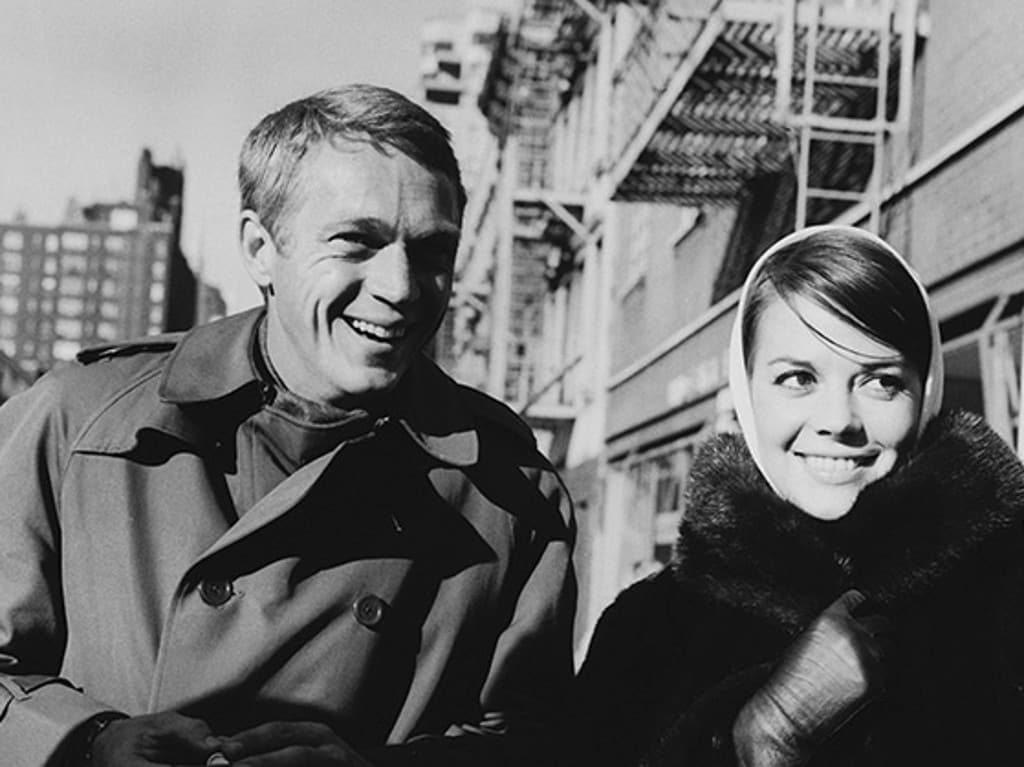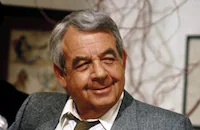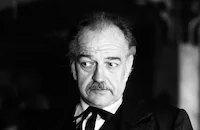Love With the Proper Stranger

Brief Synopsis
Cast & Crew
Robert Mulligan
Natalie Wood
Steve McQueen
Edie Adams
Herschel Bernardi
Tom Bosley
Film Details
Technical Specs

Synopsis
Rocky, a musician, is paged at his Manhattan union hall by Angie, with whom he spent a night at a summer hotel. She informs him that she is pregnant and asks him to recommend a doctor, whereupon he consults his current girl friend, Barbie, a stripper, but she jealously throws him out. Unaware of her pregnancy, Angie's brothers and mother want her to marry Colombo, the shy owner of a small restaurant and also of Italian extraction. Having learned of the availability of a "doctor" to solve their problem, Rocky tries to raise the necessary money, then looks up Angie at her job in Macy's and takes her to meet his unsuspecting parents, who immediately like her. However, when the two finally confront the reality of abortion, Rocky refuses to let Angie face the ordeal. Though she loves him, Angie realizes that Rocky fears marriage; and she decides to reconsider Colombo's proposal, for he has let it be known that Angie is expecting his child. Shortly thereafter, a possible reconciliation with Rocky ends in a bitter quarrel. Later, she sees him near the Macy's employees' entrance carrying a sign reading: "Better Wed Than Dead."

Director

Robert Mulligan
Cast

Natalie Wood

Steve McQueen

Edie Adams

Herschel Bernardi

Tom Bosley

Harvey Lembeck
Penny Santon
Virginia Vincent
Nick Alexander
Augusta Ciolli
Ann Hegira
Mario Badolati
Elena Karam
Nina Varela
Marilyn Chris
Wolfe Barzell
Keith Worthey
Henry Howard
Frank Marth
Richard Bowler
Lennie Bremen
Nobu Mccarthy
Jean Shulman
Lou Herbert
M. Enserro
Barney Martin
Louis Guss
Tony Mordente
Val Avery
Richard Mulligan
Paul Price

Arlene Golonka

Richard Dysart
Loraine Abate
Vincent Deadrick
Victor Tayback
Crew
Jerry Alpert
Roland Anderson
Elmer Bernstein
Elmer Bernstein
Ed Butterworth
Frank Caffey
Sam Comer
John Coonan
Grace Gregory
Isabel M. Halliburton
Edith Head
Milton Krasner
Ann Landers
Alfred Lebowitz
William Mcgarry
Gene Merritt
Curtis Mick
Robert Mulligan
Alan J. Pakula
Alan J. Pakula
Hal Pereira
Meta Rebner
Art Say
Arnold Schulman
Arnold Schulman
Aaron Stell
Sam Strangis
Wally Westmore

Film Details
Technical Specs

Award Nominations
Best Actress
Best Art Direction
Best Cinematography
Best Costume Design
Best Writing, Screenplay
Articles
Love With the Proper Stranger
McQueen's motives for taking the role weren't strictly commercial, however. Trained at the prestigious Actors Studio, he was always torn between box office success and a desire to be seen as an accomplished actor like the man he considered his chief rival, Paul Newman (who was actually director Robert Mulligan's first choice for Love with the Proper Stranger). He was also attracted to the notion of filming the offbeat love story with its frank and then risky treatment of abortion, on location in New York, where he got his start in acting. In addition, he was eager to work with Mulligan, then riding on the great success of To Kill a Mockingbird (1962). As Rocky, a self-centered jazz musician who beds an innocent young woman, gets her pregnant and finally learns a sense of commitment, responsibility and love, McQueen revealed both a vulnerable and a macho side, and it made him a sex symbol. It also earned him critical praise, including a suggestion from Newsweek that he should receive an Academy Award for his work.
Ironically, McQueen didn't even get nominated, but his top-billed co-star playing the naive but spunky Italian-American shopgirl who ends up "in trouble", received her third Best Actress nomination. Wood was apparently as taken with McQueen during filming as his female fans were. According to the biography Steve McQueen: Portrait of an American Rebel (D.I. Fine, 1993) by Marshall Terrill, Wood made several attempts to seduce her co-star but was rejected because of his fondness and respect for her ex-husband Robert Wagner, who Wood later remarried. The fact that during production McQueen was married to his first wife (of 16 years), was likely not a factor in a refusal of his leading lady's advances he was well-known for extramarital adventures throughout most of his life. On the other hand, in her biography of Natalie Wood, her sister Lana noted that Wood gave a sly indication that an affair did occur. With both parties deceased now (Wood drowned in 1981 at the age of 43), there is no way to verify the rumor.
Director Robert Mulligan came out of early television and worked on some of the legendary dramatic anthology series of the 1950s, including The DuPont Show of the Month, Studio One, and Playhouse 90. He made his feature directing debut with Fear Strikes Out (1957), the first of seven pictures he would make with producer (and future film director) Alan J. Pakula. In 1962, the two formed their own production company, and their first project was the acclaimed To Kill a Mockingbird (1962). Although their second venture, Love with the Proper Stranger, was not a resounding box office success, McQueen liked the experience enough to work with Mulligan again immediately after on Baby, the Rain Must Fall (1965) in a role that capitalized on the three-dimensional qualities of his screen persona first brought out by this film. Wood also returned to work with Mulligan again on Inside Daisy Clover (1965), which despite an intriguing Hollywood insider approach, did not greatly boost either of their careers.
In addition to Wood's Oscar® nomination for Love with the Proper Stranger, the film received nominations for Best Art Direction-Set Decoration, Best Black-and-White Cinematography, Best Costume Design, and Best Screenplay. It earned Golden Globe nominations in the top dramatic acting categories for both its stars, plus Wood received Second Place in the Golden Laurel Award for Best Female Dramatic Performance (from the Producers Guild of America) and won the Best Actress award at Argentina's Mar del Plata Film Festival. Screenwriter Arnold Schulman was also nominated by the Writers Guild of America. The film's theme song music by Elmer Bernstein, lyrics by Johnny Mercer, recorded by Jack Jones was number 62 in the Billboard Top 100 singles for 1964.
The Paris premiere of Love with the Proper Stranger, and the party following the screening at Maxim's, the city's most famous restaurant, raised substantial money for charity. McQueen attended, and his international stardom was evident in an exclusive cover story in Paris Match and by the screaming horde of fans outside his hotel.
None of the lead actors Wood, McQueen, Herschel Bernardi and Harvey Lembeck (as Wood's overprotective brothers) were Italian-American like their screen characters. McQueen's first acting break was replacing Ben Gazzara on stage in the play A Hatful of Rain, another role in which he played an Italian-American though he felt he was never convincing as that ethnic type.
Love with the Proper Stranger was the debut of Tom Bosley, who later found fame as dad Howard Cunningham in the long-running TV sitcom Happy Days. Also appearing in a small uncredited role is the director's brother Richard Mulligan, best known years later as a featured actor on the hit television spoof Soap and in the Blake Edwards Hollywood satire S.O.B. (1981).
Director: Robert Mulligan
Producer: Alan J. Pakula
Screenplay: Arnold Schulman
Cinematography: Milton Krasner
Editing: Aaron Stell
Art Direction: Roland Anderson, Hal Pereira
Original Music: Elmer Bernstein
Cast: Natalie Wood (Angie Rossini), Steve McQueen (Rocky Papasano), Edie Adams (Barbie), Herschel Bernardi (Dominick Rossini), Anne Hegira (Beetie), Harvey Lembeck (Julio Rossini).
BW-101m.
by Rob Nixon

Love With the Proper Stranger
Elmer Bernstein (1922-2004)
Elmer Bernstein, who was not related to Leonard Bernstein, was born on August 4, 1922, in New York City. He displayed a talent in music at a very young age, and was given a scholarship to study piano at Juilliard when he was only 12. He entered New York University in 1939, where he majored in music education. After graduating in 1942, he joined the Army Air Corps, where he remained throughout World War II, mostly working on scores for propaganda films. It was around this time he became interested in film scoring when he went to see William Dieterle's The Devil and Daniel Webster (1941), a film whose score was composed by Bernard Herrmann, a man Bernstein idolized as the ideal film composer.
Bernstein, who originally intended to be a concert pianist and gave several performances in New York after being discharged from military service, decided to relocate to Hollywood in 1950. He did his first score for the football film Saturday's Hero (1950), and then proved his worth with his trenchant, moody music for the Joan Crawford vehicle Sudden Fear (1952). Rumors of his "communist" leanings came to surface at this time, and, feeling the effects of the blacklist, he found himself scoring such cheesy fare as Robot Monster; Cat Women of the Moon (both 1953); and Miss Robin Caruso (1954).
Despite his politics, Otto Preminger hired him to do the music for The Man With the Golden Arm, (1955) in which Frank Sinatra played a heroin-addicted jazz musician. Fittingly, Bernstein used some memorable jazz motifs for the film and his fine scoring put him back on the map. It prompted the attention of Cecil B. De Mille, who had Bernstein replace the ailing Victor Young on The Ten Commandments (1956). His thundering, heavily orchestrated score perfectly suite the bombastic epic, and he promptly earned his first Oscar® nod for music.
After The Ten Commandments (1956), Bernstein continued to distinguish himself in a row of fine films: The Rainmaker (1956), Sweet Smell of Success (1957), Some Came Running (1958), The Magnificent Seven (a most memorable galloping march, 1960); To Kill a Mockingbird (unique in its use of single piano notes and haunting use of a flute, 1962); Hud (1963); earned a deserved Academy Award for the delightful, "flapper" music for the Julie Andrews period comedy Thoroughly Modern Mille (1967), and True Grit (1969).
His career faltered by the '80s though, as he did some routine Bill Murray comedies: Meatballs (1980) and Stripes (1981). But then director John Landis had Bernstein write the sumptuous score for his comedy Trading Places (1983), and Bernstein soon found himself back in the game. He then graced the silver screen for a few more years composing some terrific pieces for such popular commercial hits as My Left Foot (1989), A River Runs Through It (1992) and The Age of Innocence (1993). Far From Heaven, his final feature film score, received an Oscar® nomination for Best Score in 2002. He is survived by his wife, Eve; sons Peter and Gregory; daughters Emilie and Elizabeth; and five grandchildren.
by Michael T. Toole
Elmer Bernstein (1922-2004)
Quotes
Trivia
Notes
Locations filmed in New York City.

Miscellaneous Notes
Released in United States Winter December 1963
Released in United States February 1964
Released in United States on Video February 1, 1989
Released in United States 1982
Released in United States October 26, 1989
Shown at Greater Fort Lauderdale Film Festival (Tribute to Natalie Wood) October 26, 1989.
Released in United States Winter December 1963
Released in United States February 1964
Released in United States on Video February 1, 1989
Released in United States 1982 (Shown at FILMEX: Los Angeles International Film Exposition (Natalie Wood: A Retrospective) March 16 - April 1, 1982.)
Released in United States October 26, 1989 (Shown at Greater Fort Lauderdale Film Festival (Tribute to Natalie Wood) October 26, 1989.)













